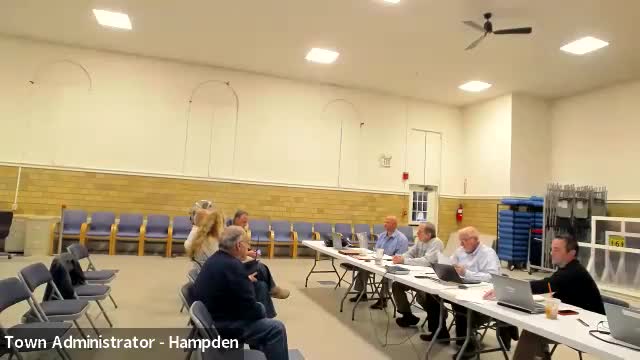Hampden officials weigh using $1.8 million in free cash to lower tax impact, debate delaying warrant articles
Get AI-powered insights, summaries, and transcripts
Subscribe
Summary
Town leaders debated whether to apply a larger-than-normal free cash balance toward paying a water-project debt, reducing next year's tax rate, or preserving stabilization for future capital needs; the board voted to briefly reopen and then close the special town meeting warrant and agreed to further advisory meetings.
Select Board members and finance staff in the Town of Hampden spent the bulk of their Oct. 14 meeting discussing how to use an unusually large free cash balance and how that decision will affect tax rates, upcoming capital needs and the special town meeting warrant.
Town finance staff reported an official free cash certification of about $1.8 million, a sum larger than typical for the town. Finance and board members traced the increase to last year’s accounting decisions tied to a multi-year water project: the board had expected to apply $650,000 from stabilization and about $1.1 million to pay down project debt, but state reviewers at the Division of Local Services (DLS) and Department of Revenue (DOR) required different accounting treatments. As a result, the town reduced anticipated local receipts and adjusted the overlay reserve to create a path for declaring the funds as surplus; that sequence produced the $1.8 million free cash figure the town now must allocate.
Board members and staff discussed several options: use some free cash to reduce the tax rate (numbers discussed included applying roughly $600,000–$700,000 toward the tax rate), apply stabilization funds toward a water-district commitment (the board previously agreed to apply $6.50 or $6.50-equivalent from stabilization toward water debt), delay noncritical warrant articles to the spring, or issue short-term borrowing. Town staff outlined the water-project costs and grant support: the water project’s net cost after ARPA and grant funds was discussed at about $2.13 million, with a $1 million state grant already identified; the town faces remaining projected obligations that could require borrowing if not appropriated.
Those fiscal choices have implications for next year’s tax rate. Board members and staff presented modeling that ranged from roughly a 7% tax increase (if $9.50 of free cash were applied at town meeting) to a higher increase exceeding 12% under other scenarios that include all warrant articles. Several members argued that taxpayers had been told the town planned to use the tax receipts to pay down water debt and that failing to apply free cash to that purpose would be a breach of faith with voters; others cautioned that spending the entire free cash balance now would leave little cushion for unforeseen expenses, could affect the town’s bond rating when it seeks long-term borrowing (for example, for a firehouse), and would reduce stabilization below recommended reserves.
The board agreed to reopen the special town meeting warrant temporarily, add a Community Preservation Act (CPA) request from the housing authority as a new article, and then reclose the warrant. Members directed further work: advisory committee meetings will refine figures and consider which warrant articles to recommend for no action or deferral; staff will refine free-cash projections, check assessors’ new-growth estimates, and update warrant article cost refinements ahead of the advisory committee meeting scheduled next week.
Quotes from the meeting reflected the split in outlooks. One select board member said, "If you use that money now to reduce the tax rate, then there won't be any payments on the water project, and I consider that a breach of faith." The town’s new accountant advised caution on borrowing: "I would typically advise against borrowing as much as possible," she said, recommending conservative spending given uncertain state aid in future years.
The board did not adopt a final allocation at the meeting; members signaled a preference to apply some portion of free cash toward the tax rate while holding back funds for critical capital needs. The advisory committee will meet next week to propose recommendations for the board to consider before the special town meeting.
